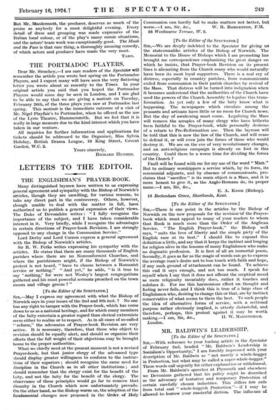[To the Editor of the SPECTATOR.]
SIR,—There is one point in the articles by the Bishop of Norwich on the new proposals for the revisiontf the Prayer-. book which must appeal to many of your readers to whom that Book is much more than the Order of the Anglican Service. "The English Prayer-book," the Bishop well says, "suits the love of liberty and the simple piety of the English race at its best." I should like to expand this definition a little, and, say that it keeps the instinct and longing for religion alive in the bosoms of many Englishmen who make no dogmatic profession. It is first of all an immortal poem. Secondly, it goes as far as the magic of words can go to express the average man's desire not to lose touch with faith and hope, if any such ground of attachment can be found. To achieve this end it says enough, and not too much. I speak for myself when I say that it does not affront the sceptical mood as mere religiosity invariably does, rather it touches and subdues it. For me this harmonious effect on thought and feeling never fails, and I think this is true of a large class of Englishmen who, desiring to change this or that, are by instinct conservative of what seems to them the best. To such people the idea of alternative forms of service, with a sectional purpose rather obviously implied, is utterly distasteful, and therefore, perhaps, this protest against it may be worth










































 Previous page
Previous page